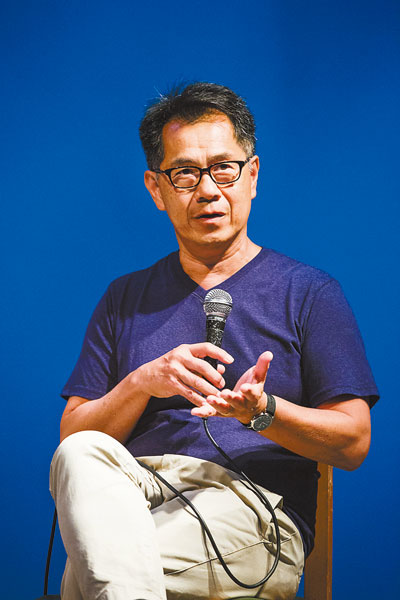
Cao Zhen caozhen0806@126.com FIFTEEN U.S. feature movies and documentaries on Chinese-Americans made by Chinese-American directors between 1982 and 2015 are being shown at OCT-LOFT, providing a complex picture of Chinese immigration in the United States during different eras. Since all the movies have never been publicly screened on the Chinese mainland, the free-entry event, starting from June 26, has attracted a crowd of local Chinese and expats, with most of the seats in the B10 Live taken at every screening. On the first two nights, Hong Kong-born American film director Wayne Wang, who is best known for his film “The Joy Luck Club,” showed his “Chan Is Missing” (1982) and “Eat a Bowl of Tea” (1989) at the event. “Chan Is Missing,” which is shot in black and white, centers on two Chinese-Americans searching for Chan. In the process, they encounter a huge cast of Chinese-Americans doing various jobs in the San Francisco Chinatown, mirroring the complexities of the Chinese-American community in the 1980s. Diversity among the Chinese-American characters is clearly addressed in the movie. “This movie is not like the stereotyped Chinese people in Hollywood movies, such as prostitutes, dragon ladies, cooks or cleaners,” Wang told the audience after the screening. “Before 1980, most Chinese in Chinatown were from Taiwan. Since the mainland’s reform and opening up, many mainlanders moved to America, so you can also see the conflict between mainlanders and Taiwanese in this movie.” The audience was stunned by Wang’s realistic depiction of diverse characters in the movie. Wang responded that after working in Hong Kong’s TVB for a while, his first job in America was teaching in a language school for immigrants in a Chinatown, where he encountered an amazing number of Chinese from Taiwan, Hong Kong and the mainland. “Eat a Bowl of Tea” takes a more dramatic approach by featuring a Chinese couple that has to deal with the expectations of the entire Chinatown community to give birth to babies in the 1950s. The movie offers a poignant view of the emotional costs of the previous immigration law which forbade male Chinese-American immigrants from bringing their wives. In a comic manner, these two films reveal Chinese-Americans’ complex love-hate relationship with the United States. One unique documentary which has nothing to do with immigrants showed at the event was the U.S.-born Chinese director Arthur Dong’s “Licensed to Kill.” Written, directed and narrated by Dong (a homosexual himself) in 1997, the documentary interviews seven U.S. murderers for their homophobic murders. In the documentary, Dong said that since he was attacked by homophobes when he was young, he wanted to know why these murderers committed such brutality. Explicit, horrifying brutal crime-scene photos interwoven with articulate and candid interviews, the documentary shows that homophobia can be pinned on religious, family, political and self-esteem reasons. “I haven’t seen the documentary for a while. It brings back a lot of memories,” said Dong after the screening, saying he was emotional after watching it again. He said before interviewing the murderers, he didn’t tell them that he was gay because he wanted to be objective. “My job was to understand these men. Thinking back, I was excited, not scared, when interviewing them. The documentary was not about me; it was about them.” Dong said one exception was the interview with a murderer who initially didn’t want to be filmed. Dong then told him, “You know, my boyfriend and I did something like that before.” At the event, the Shenzhen audience asked about Dong’s married life. Dong joked that after he married his boyfriend, no relatives gave him “lucky money for singles” during the Spring Festival because he’s married. “Many of my relatives are farmers in Guangdong villages and now they can accept my marriage. That’s a major shift!” he said. Over the following nights, movies and documentaries made in recent years will be shown. All films are in English. | 
